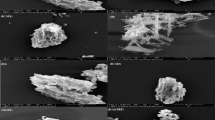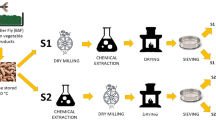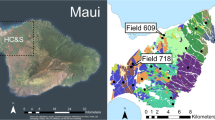Abstract
Coated slow-release fertilizers have good slow-release effects, can be effectively utilized, and are important new types of fertilizers. Compared with single-layer coatings, double-layer coatings have more durable slow-release effects. A double-layer-coated slow-release fertilizer (DCSRF) was prepared with urea as the core, citric acid-modified starch and polyvinyl alcohol as the inner coating, and sodium alginate as the outer coating. Compared with the single-layer coated fertilizer (SCSRF), the DCSRF demonstrated superior slow-release effects, releasing 69.2% of the nutrients within 38 days in water. Additionally, adding 2% DCSRF to soil increased its maximum water-holding capacity by 8%. Pot trials revealed that the DCSRF considerably improved target crop growth, including tiller number, plant height, root depth, and leaf width, outperforming the other methods. The DCSRF, which is made from eco-friendly, low-cost, and widely available materials, exhibits excellent water-retention and slow-release properties, offering a promising theoretical foundation for the development of new fertilizers.
This is a preview of subscription content, access via your institution
Access options
Subscribe to this journal
Receive 12 print issues and online access
$259.00 per year
only $21.58 per issue
Buy this article
- Purchase on SpringerLink
- Instant access to full article PDF
Prices may be subject to local taxes which are calculated during checkout








Similar content being viewed by others
Data availability
The data that support the findings of this study are available from the corresponding author, Hui Li, upon reasonable request.
References
Duan Q, Jiang S, Chen F, Li Z, Ma L, Song Y, et al. Fabrication, evaluation methodologies and models of slow-release fertilizers: a review. Ind Crops Products. 2023;192:116075. https://doi.org/10.1016/j.indcrop.2022.116075.
Ghumman ASM, Shamsuddin R, Nasef MM, Yahya WZN, Abbasi A, Almohamadi H. Sulfur enriched slow-release coated urea produced from inverse vulcanized copolymer. Sci Total Environ. 2022;846:157417. https://doi.org/10.1016/j.scitotenv.2022.157417.
Salman OA. Polymer coating on urea prills to reduce dissolution rate. J Agric Food Chem. 1988;36:616–21. https://doi.org/10.1021/jf00081a053.
Salman OA, Hovakeemian G, Khraishi N. Polyethylene-coated urea. 2. Urea release as affected by coating material, soil type and temperature. Ind Eng Chem Res. 1989;28:633–8. https://doi.org/10.1021/ie00089a022.
Salimi M, Motamedi E, Motesharezedeh B, Hosseini HM, Alikhani HA. Starch-g-poly (acrylic acid-co-acrylamide) composites reinforced with natural char nanoparticles toward environmentally benign slow-release urea fertilizers. J Environ Chem Eng. 2020;8:103765. https://doi.org/10.1016/j.jece.2020.103765.
Han X, Chen S, Hu X. Controlled-release fertilizer encapsulated by starch/polyvinyl alcohol coating. Desalination. 2009;240:21–6. https://doi.org/10.1016/j.desal.2008.01.047.
Sofyane A, Ablouh E, Lahcini M, Elmeziane A, Khouloud M, Kaddami H, et al. Slow-release fertilizers based on starch acetate/glycerol/polyvinyl alcohol biocomposites for sustained nutrient release. Mater Today Proc. 2021;36:74–81. https://doi.org/10.1016/j.matpr.2020.05.319.
Dai R, Woo MW, Chen H, Dang X, Mansouri S, Shan Z. Hydrogel beads based on oxidized corn starch cross-linked with gelatin for tartrazine adsorption from aqueous environments. Polym J. 2017;49:549–55. https://doi.org/10.1038/pj.2017.14.
Chiaregato CG, Faez R. Micronutrients encapsulation by starch as an enhanced efficiency fertilizer. Carbohydr Polym. 2021;271:118419. https://doi.org/10.1016/j.carbpol.2021.118419.
Naz MY, Sulaiman SA, Ariwahjoedi B, Shaari KZK. Natural carbohydrate polymer coatings for green urea. Surf Eng. 2014;31:486–91. https://doi.org/10.1179/1743294414y.0000000381.
Sarkar A, Biswas DR, Datta SC, Dwivedi BSD, Bhattachayya R, Kumar R, et al. Preparation of novel biodegradable starch/poly (vinyl alcohol)/bentonite grafted polymeric films for fertilizer encapsulation. Carbohydr Polym. 2021;259:117679. https://doi.org/10.1016/j.carbpol.2021.117679.
Zafar N, Niazi MBK, Sher F, Khalid U, Jahan Z, Shah GA, et al. Starch and polyvinyl alcohol encapsulated biodegradable nanocomposites for environment friendly slow release of urea fertilizer. Chem Eng J Adv. 2021;7:100123. https://doi.org/10.1016/j.ceja.2021.100123.
Cheng J, Liao Z, Hu SC, Geng ZC, Zhu MQ, Xu WZ. Synthesis of an environmentally friendly binding material using pyrolysis by-products and modified starch binder for slow-release fertilizers. Sci Total Environ. 2022;819:153146. https://doi.org/10.1016/j.scitotenv.2022.153146.
Otey FH, Trimnell D, Westhoff RP, Shasha BS. Starch matrix for controlled release of urea fertilizer. J Agric Food Chem. 1984;32:1095–8. https://doi.org/10.1021/jf00125a041.
Pimsen R, Porrawatkul P, Nuengmatcha P, Ramasoot S, Chanthai S. Efficiency enhancement of slow release of fertilizer using nanozeolite–chitosan/sago starch-based biopolymer composite. J Coat Technol Res. 2021;18:1321–32. https://doi.org/10.1007/s11998-021-00495-9.
Fu J, Wang C, Chen X, Huang Z, Miu J, Shi L, et al. Preparation and characterization of attapulgite-fly ash–based binuclear slow-release fertilizer encapsulated by eudragit. Agron J. 2019;111:2411–21. https://doi.org/10.2134/agronj2018.12.0753.
Li H, Wang N, Zhang L, Wei Y, Zhang L, Ma Y, et al. Engineering and slow-release properties of lignin-based double-layer coated fertilizer. Polym Adv Technol. 2023;34:2029–43. https://doi.org/10.1002/pat.6029.
Liu J, Yang Y, Gao B, Wang W, Cheng D, Yao Y, et al. Hydrophobic-densified high-elastic waste-carton-derived biopolymer-coated fertilizers: enhanced performance and controlled-release mechanism. J Environ Chem Eng. 2023;11:110591. https://doi.org/10.1016/j.jece.2023.110591.
Liao J, Lin Y, Xu M, Luo Z, Jiang G, Chen F, et al. Preparation of hydrophobic hard gelatin capsules for slow-release fertilizers. Polym Test. 2024;134:108427. https://doi.org/10.1016/j.polymertesting.2024.108427.
Priya E, Sarkar S, Maji PK. A review on slow-release fertilizer: nutrient release mechanism and agricultural sustainability. J Environ Chem Eng, 2024: 113211. https://doi.org/10.1016/j.jece.2024.113211.
Zhao X, Qi X, Chen Q, Ao X, Guo Y. Sulfur-modified coated slow-release fertilizer based on castor oil: synthesis and a controlled-release model. ACS Sustain Chem Eng. 2020;8:18044–53. https://doi.org/10.1021/acssuschemeng.0c06056.
Zhou Y, Lei SC, Luo M, Luo H, Luo YX, Han NJ. Study on the preparation method of sodium alginate microspheres. Biol Chem Eng. 2021;7:131–3.
Acknowledgements
This work was supported by the National Natural Science Foundation of China (No. 22463006); the National Natural Science Foundation of China (No. 52463015); the Joint Fund between Gansu Provincial Science and Technology Plan Project (Natural Science Foundation) (23JRRA794); the Gansu Provincial Science and Technology Plan Project (Science and Technology Specialist) (24CXGA059); and the Qinzhou District Science and Technology Major Special Project in Tianshui City (2024-NCKJG-4929).
Author information
Authors and Affiliations
Corresponding author
Ethics declarations
Conflict of interest
The authors declare no competing interests.
Additional information
Publisher’s note Springer Nature remains neutral with regard to jurisdictional claims in published maps and institutional affiliations.
Rights and permissions
Springer Nature or its licensor (e.g. a society or other partner) holds exclusive rights to this article under a publishing agreement with the author(s) or other rightsholder(s); author self-archiving of the accepted manuscript version of this article is solely governed by the terms of such publishing agreement and applicable law.
About this article
Cite this article
Li, H., Yan, H., Liao, X. et al. Preparation of a citric acid-modified starch/sodium alginate double-layer-coated slow-release fertilizer and its slow-release performance. Polym J (2025). https://doi.org/10.1038/s41428-025-01082-0
Received:
Revised:
Accepted:
Published:
DOI: https://doi.org/10.1038/s41428-025-01082-0



